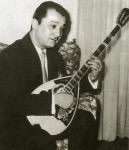Manolis Chiotis
| Manolis Chiotis | |
|---|---|
 Manolis Chiotis | |
| Background information | |
| Birth name | Emmanuil Hiotis |
| Born |
March 21, 1920 Thessaloniki, Central Macedonia, Greece |
| Died |
March 21, 1970 (aged 50) Athens, Greece |
| Genres | Laiko, Elafrolaiko |
| Occupation(s) | Bouzoukist, Guitarist, Singer, Songwriter, Producer |
| Instruments | Four-course Bouzouki, Guitar, Vocals |
| Years active | 1935-1970 |
Manolis Chiotis (Greek: Μανώλης Χιώτης; March 21, 1920, Thessaloniki – March 21, 1970, Athens) was a Greek rebetiko and laiko composer, singer, and bouzouki player.[1] He is considered one of the greatest bouzouki soloists of all time. He popularised the four-course bouzouki (tetrachordo) and introduced the guitar-like tuning, who found it better suited to the kind of virtuoso playing he was famous for.[2]
Chiotis had other successes. In the summer of 1961, he played for Aristotle Onassis and Maria Callas, Prince Rainier III of Monaco and Grace Kelly. Journalist Dimitris Liberopoulos, Onassis’ biographer, writes in his book that when the two couples joined one of Chiotis’ shows in Athens, they asked to meet him in person to congratulate him.
Callas told Chiotis that she had been translating the lyrics of his songs to Princess Grace all night long and the American actress loved them because “she is a woman in love.” At that moment, Kelly asked Chiotis what the difference between a bouzouki and an electric guitar is.
Chiotis’ answer was rather unexpected; “Mrs. Callas, please explain to Princess Grace that the strings of an electric guitar vibrate due to electricity, while the strings of a bouzouki vibrate through the heart.”
References
- ↑ Μανώλης Χιώτης (1920 – 1970) [Manolis Chiotis (1920 - 1970)] (in Greek). SanSimera.gr. (English translation)
- ↑ Tasos Schorelis, Ρεμπέτικη Ανθολογία (Rebetiki Anthologia), in Greek, four volumes, Athens 1977–1987.